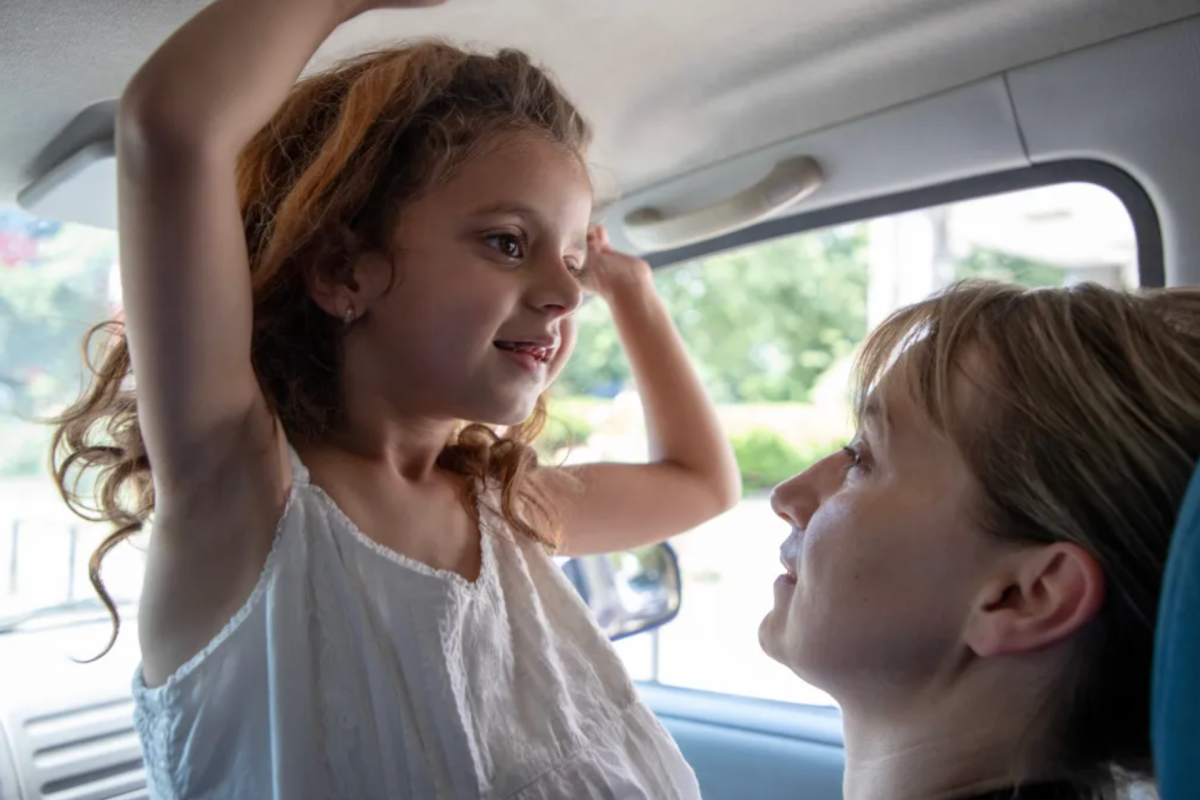Knock knock. Who’s there? It’s July. Surprise! Isn’t that July-tful? Now with that obligatory mid-year dad joke out of the way, it’s time to round up our favourite films of the year so far.
The following list is comprised of films released in Australia this year and deemed worthy of being given 4.5 to 5 stars by ScreenHub critics.
To see all film reviews from ScreenHub, head to this link.
All Of Us Strangers
Review by Stephen Russell:
‘Adam, whose parents were killed in a car crash when he was 12-years-old, has inherited a fear of intimacy both through this trauma and, later, the long shadow of the HIV/AIDS crisis, when sex could equal death. But even as he holds Harry’s advances at arm’s length, he finds himself catching a train out of London, seeking solace in the shadows that stand still in his childhood home.
If at first Jamie Bell’s leather jacketed man lurking in the bushes nearby appears to be a beat pick-up manoeuvre in waiting, instead this shadowy figure proves, impossibly, to be Adam’s father, appearing as if the very same age as the day he died. Heading back with him to the home they shared together reveals The Crown star Claire Foy as his mum, also somehow emerged from glowing amber.
It’s a tantalising thought, what we would say to a lost loved one if we could steal one more night, or maybe more. One that’s sure to play heavy with tear-slicked pain on the mind of anyone in a similar situation.
But if Adam’s parents, seemingly aware of the strange fracture in time in which they pass their days, can catch up on all that has passed in his achingly empty decades without them, these conversations carry complexity. Mum worries he will ‘lead a lonely life,’ and then, as Adam does, indeed, invite Harry upstairs and gradually into his life, that the adverts she recalls as heavy as tombstones will place her son at risk with his ‘special friend’.’
Read Stephen Russell’s full review of All Of Us Strangers
Drive-Away Dolls
Review by Silvi Vann-Wall
‘Directed by Ethan Coen (sans brother Joel, for the first time in a while) and written by him and his wife Tricia Cooke (who identifies as queer), Drive-Away Dolls is a fast-paced, slapstick caper about a couple of lesbians on a road trip gone oh-so-wrong.
In the throes of Sapphic sexual ecstasy, we meet Jamie (Margaret Qualley, Poor Things), an ‘uninhibited free spirit’, who has just broken up with her longtime girlfriend Sukie (Beanie Feldstein, Booksmart). When Jamie discovers that her demure friend Marian (Geraldine Viswanathan, The Beanie Bubble) is depressed and hasn’t had sex in years, the two go in search of a fresh start – which translates to an impromptu road trip to Tallahassee.
Things go awry, as things are wont to do, when they cross paths with a group of inept criminals who are chasing a mysterious suitcase stolen from an even more mysterious Spanish man (played by Pedro Pascal, whose on-screen death scene here pays specific homage to Game of Thrones).
Originally titled Drive-Away Dykes (which is obviously the better title, but it got nixed due to the bigwigs being PUSSIES), this feminist odyssey-meets-queer lovefest-meets-late night B movie is the must-see of the month.’
Read Silvi Vann-Wall’s full review of Drive-Away Dolls
Read: Furiosa: A Mad Max Saga review – grinds every gear
Lyd
Review by Silvi Vann-Wall
‘Opening with a series of shots showing a quiet, decrepit city of Lyd with only a few signs of life – children playing in an alley, a man crossing a carpark in a motorised scooter – the title overlay quickly changes from Lyd: City of Palestine, to Lyd: City of Israel. While this happens, a voiceover welcomes us to the city.
This voice is the Voice of Lyd, played by Maisaa Abd El-Hadi, who is characterised as a warm, gentle female presence who calmly explains the significance of the Nakba. ‘You won’t believe the way people have behaved just because they want me,’ she says.
The Voice of Lyd explains that this documentary moves between two worlds: the real world, captured on camera in talking heads, drone shots, archival footage and photographs, and a fictional world in which the Nakba never happened: a technicolor, animated version of Lyd where things are very different – in short, lives are enriched, and Arab people are the ones who are privileged.
In the course of the film, we will hear from survivors of the Nakba, their children, and their grandchildren, as well as school teachers and young activists. We also hear from the current mayor of Lod – who insists the city is a thriving melting pot of cultures – and from former Israeli soldiers who fought in the 1948 war.’
Read Silvi Vann-Wall’s full review of Lyd
La Chimera
Review by Silvi Vann-Wall
‘Our leading man Arthur (Josh O’Connor) is a British archaeologist who’s done hard time after getting involved in a network of graverobbers in Italy. These robbers steal and fence artefacts from the Etruscan period, most of which were left in tombs as offerings for spirits in the afterlife. Arthur has been released from prison, but rather than denouncing his criminal ways, he gets right back into it. After all, he’s not just any robber: he is a diviner, and uses his powers to locate those coveted artefacts. He’s also poor.
Arthur doesn’t give a damn about the artefacts, though. His thoughts lie elsewhere as he remembers his long-gone fiancé Beniamina, and searches across the countryside for a way to reunite with her – even if it means travelling to the underworld. Maybe it seems like a fool’s errand, but for a man whose supernatural forces tell him where ancient treasure is, anything is possible.
La Chimera is Indiana Jones if directed by Frederico Fellini and Agnes Varda, with a troubadour chorus, a blend of sped-up film and long static shots, and moments of direct-to-camera dialogue all adding to the disorienting dream-like vibe of the film. It’s also a clear retelling of the Ariadne myth, complete with a red thread (seemingly belonging to Beniamina’s dress, or at least that’s how Arthur remembers it), that guides the protagonist to his destiny.
Cinematographer Hélène Louvart, who has worked with Rohrwacher four times now (and also shot Varda’s Beaches of Agnes), orients and disorients us with the camera, divining a story as Arthur divines artefacts. Sometimes the narrative moves this way and follows the tombaroli and their faceless boss Spartaco, sometimes it moves that way and follows Beniamina’s elderly mother Flora (Isabella Rossellini) as she teaches a young woman named Italia (a luminous Carol Duarte) how to sing in return for cooking and cleaning services.
Italia’s name may be a little on the nose – she is literally named for the country she resides in, and as she voices her disapproval for Arthur’s graverobbing you can’t help but feel that the spirit of Italy is reprimanding him. But the way this is acknowledged in the film – the tombaroli laugh at her and calling her ‘Viva Italia’ (long live Italy) – shows that Rohrwacher is not one to shy away from obvious metaphors.’
Read Silvi Vann-Wall’s full review of La Chimera
Housekeeping For Beginners
Review by Stephen Russell
‘‘Woman! No filthy words!’
So says Mia (Dzada Selim), the tiny emperor of a queerly beloved household held tight in a cinema verité hug in Of An Age director Goran Stolevski’s luminous tribute to found family, Housekeeping for Beginners.
The youngest daughter of Suada (a mighty turn from Alina Serban) and the little in stature, if not presence, sister of Vanessa (Mia Mustafa, one to watch), she is a Ferris wheelspin of anarchically effervescent energy and will not stand for potty-mouthed insults at the dinner table. Alas, for Mia’s sweet if forthright sensibility, the filthy words fly with gay abandon in this bittersweet ode to a broader understanding of love.
With an air of Armistead Maupin’s Barbary Lane in the Tales of the City novels, this bursting-at-the-seams suburban home in Skopje, the capital city of North Macedonia – Melbourne-based Stolevski’s birth country – contains multitudes.
Beyond the Roma family at its heart, outlined above, we also meet Dita, played by Anamaria Marinca, the ‘wolf-eateress’ of Stolevski’s mesmeric folk horror You Won’t Be Alone. She’s technically Suada’s social worker, but has blurred professional boundaries, crossing business with pleasure in moving her in. Then there’s Toni (Vladimir Tintor), Dita’s perma-stubbled and ruffled best mate, a taciturn man of few words and even fewer smiles whose latest Grindr conquest, 19-year-old Roma man Ali (the sparkling Samson Selim) has purposefully forgotten to leave.’
Read Stephen Russell’s full review of Housekeeping For Beginners
In The Room Where He Waits
Review by Stephen Russell
‘It takes a remarkable actor to hold an audience rapt single-handedly. Even more so when the impersonal lines of a generic hotel room define their stage.
Wiradjuri star Joel Bray achieved it with his deeply personal live performance piece, Biladurang. Daniel Monks, award-winning star of stage and screen, has what it takes, too, underlined by his commanding turn in director Timothy Despina Marshall’s spooky, lockdown-shot debut feature, In the Room Where He Waits.
It casts Perth-born, London-based Monks as Tobin ‘Tobi’ Wade, a stage actor who has landed his first big Broadway gig in the juicy role of unreliable narrator Tom from Tennessee Williams’ haunting The Glass Menagerie. But this glorious achievement has been overshadowed, first by Tobi’s break up with his boyfriend, then almost derailed by a family tragedy that necessitates his return to Brisbane.
Languishing in two weeks’ mandated hotel room quarantine, Tobi’s first glimpsed sobbing through the steamed-up curtain of a shower, his guttural sobs muffled by running water and the piercing niggle of composer Joseph Twist’s already unnerving, string-laden score.
He hasn’t told his tetchy director, Matthew (Anthony Brandon Wong), the truth about this relocation, feigning an escape to Los Angeles while rehearsals are forced onto Zoom. A white lie guarded by his best mate and Menagerie co-star Sienna (Annabel Marshall-Roth) in New York.’
Read Stephen A Russell’s full review of In The Room Where He Waits
Hundreds Of Beavers
Review by Silvi Vann-Wall
‘Jean Kayak’s visit to the merchant incites his mission: to kill ‘hundreds of beavers’ in order to win the hand of the merchant’s daughter. It also ‘unlocks’ new mechanics for him to use in his adventure, much like a video game would. For example: the more pelts he brings back, the better weaponry he has to choose from.
The more he successfully captures and kills the creatures, the better understanding he gains of their strengths and weaknesses. Rabbits are partial to carrots (and snow bunnies), but raccoons are partial to the rabbits – so he must be careful when laying his trap. Fish are attracted to flies, but to get flies, one must acquire poop.
That poop can also be used to attract the beavers – though he soon discovers something else they are more inclined towards, which I won’t spoil here.
The brilliance of the film shines in its commitment to the bit – instead of trying to convince the audience that the beavers etc are real creatures, it leans into the fact that they are obviously human by revealing feet, hands, and human skeletons underneath.
Instead of creating a world that obeys the laws of physics, Beavers‘ version of the wilderness has several portals that can zip Jean around in a flash. And instead of following logic, Jean Kayak stumbles into more and more absurd situations that he solves in the most round-about ways possible.’
Read Silvi Vann-Wall’s full review of Hundreds Of Beavers





